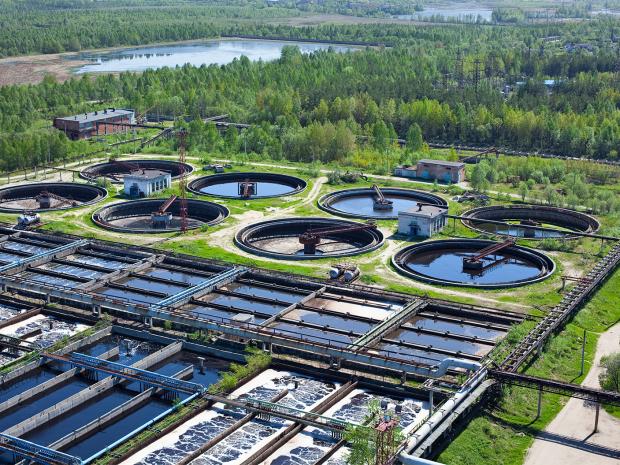- Academics
Environmental Engineering, M.S.

Environmental Engineering is a diverse field that focuses on the sustainable use and preservation of natural resources anthropogenic interactions in an increasingly urbanized world. It is a career field in high demand and it was recently ranked as the fifth most valuable college major (Forbes, May 2012). At the School of Engineering, our program has an urban environmental systems emphasis and it is unique in concentrating on many challenges that New York City and major cities of the world face.
The MS in Environmental Engineering prepares graduates to plan, functionally design, control, operate and manage municipal and industrial pollution-prevention systems. Students are exposed to a learning atmosphere that provides a mix of theory and practical problem-solving approaches. The flexible course options and student research projects offer a variety of opportunities. Areas of research and scholarly activities supported by some of the best faculty in NYC include environmental systems management, monitoring, sensing, and visualization, water security, flood risk management, conflict resolution, river water quality modeling, groundwater modeling, solid and hazardous waste management, contamination remediation, climate change studies, and development of decision support systems and GIS based applications.
Curriculum
To earn an MS in Environmental Engineering, you must complete 30 credits as described below, with a 3.0 GPA or better in all graduate courses and in all guided studies (readings, projects, theses, dissertations). Averages are computed separately for courses and guided studies. Transfer credits from other institutions are not included in this average.
For the most recent program curriculum, view the Bulletin.
Core Courses (12 Credits)
Required
- 3 Credits Environmental Chemistry & Microbiology CE-GY 7373
- The course introduces the chemistry and microbiology of polluted and natural waters, including applications of principles developed.
- 3 Credits Water & Wastewater Treatment CE-GY 7423
- The course covers the physical, chemical and biological principles of process design and treatment of water and wastewater. Topics include aeration, filtration, softening, chemical treatment, coagulation, occulation, desalination, and taste and odor control.
Co-requisite: CE-GY 7373.
Select 2 of the Following
- 3 Credits Hydrology CE-GY 7223
- This course covers: Hydraulic cycle; meteorological considerations; analysis of precipitation, runoff, unit hydrographs, flood routing and reservoir storage; principles of groundwater hydrology; and an introduction to frequency analysis of floods and droughts.
Prerequisite: Graduate Standing - 3 Credits Groundwater Hydrology and Pollution CE-GY 7233
- This course looks at the characteristics of confined and unconfined flow of water through porous media; groundwater and well hydraulics; quality of groundwater; environmental influences; groundwater pollution; management aspects of groundwater and groundwater modeling.
Prerequisites: CE-UY 2214 (Fluid Mechanics) or equivalent or instructor’s permission. - 3 Credits Environmental Systems Management CE-GY 7753
- This course provides an overview of information technologies as applied to the remote sensing of environmental infrastructure systems, and includes the development of infrastructure system databases to assist complex decision-making on environmental infrastructures.
Prerequisite: Graduate Standing - 3 Credits Environmental Impact Assessment CE-GY 7673
- The course examines legal and technical requirements in preparing environmental-impact statements. Considerations include legal and technical requirements, the procedure and the interdisciplinary nature of the analysis. Topics include overall impact evaluation, categories of impacts, problem definition, quantification of impact, methods used in analysis, field evaluations, mitigations, hearing procedures and management. Practical examples and case studies are used.
Prerequisite: Graduate Standing
Major Courses (9 Credits)
Select 3 of the Following
- 3 Credits Modeling Fate and Transport of Surface Water Pollution CE-GY 7473
- The course covers dispersal and decay of contaminants introduced into lakes, streams, estuaries and oceans, and the effects of pollutants on chemical quality and ecology of receiving waters.
Prerequisite: Graduate Standing - 3 Credits Environmental Geotechnology CE-GY 8493
- The course covers: Clay mineralogy; soil-water interaction processes; chemical transport through soils; hydraulic conductivity, diffusion and attenuation mechanisms; water-disposal systems; design of land-fills, seepage barriers and cut-off walls; geo-environmental site characterization techniques; and soil-remediation techniques.
Prerequisite: undergraduate soil mechanics, CE-UY 3153 or equivalent. - 3 Credits Solid Waste Management CE-GY 7703
- The course covers engineering aspects of solid waste collection, transport and disposal, including incineration, sanitary landfill, composting, recovery and reutilization. Also covered is the economic evaluation of factors affecting selection of disposal methods.
Prerequisite: Graduate Standing - 3 Credits Selected Topics in Water Resources and Hydraulic Engineering I CE-GY 7353
- This course examines topics of current interest in water resources and hydraulic engineering. Topics vary with each offering and are disseminated before the semester of offering.
Prerequisite: instructor’s permission. - 3 Credits Air Pollution CE-GY 7523
- This course discussed the causes and effects of air pollution, methods of sampling, interpretation of data, meteorological aspects, and methods of air-pollution control.
- 3 Credits Selected Topics in Environmental and Water Resources Engineering I CE-GY 7723
- This course examines topics of current interest in environmental and water resources
engineering. Topics vary with each offering and are disseminated before the semester of offering. - 3 Credits Climate Science: Realities & Risks of A Changing Climate CE-GY 7913
- This course is the first term of a two-term sequence covering climate and energy. The first term will focus on climate science - the basics of the earth system, how it is observed and modeled, how has it changed in the recent and distant past, how it might change in the future under natural and human influences, and what impacts those changes might have on ecosystems and society. The most recent US government and UN assessment reports will serve as texts, supplemented by the original research literature and media coverage. This course should be of interest (and accessible) to students interested in climate science, sustainability, energy technologies, energy businesses, and energy policies. Prerequisites are only numeracy, simple algebra, basic calculus, and general science knowledge.
Prerequisite: Graduate standing or department permission - 3 Credits Geomatics and Gis Application in Civil and Environmental Engineering CE-GY 7733
- The course covers the principles of Geographic Information Systems and the system's applications in Civil and Environmental Engineering. Topics covered include system structure, data capture, data processing, data analysis, presentation and reports. Coordinate systems, map projections, remote sensing, and GPS-GIS integrations will be taught. Infrastructure planning, construction management, earthwork machine control, highway rehabilitations, structure deformation and EIA will be presented.
Prerequisite: Graduate Standing or Departmental Permission - 3 Credits Detection and Control of Waterborne Pathogens CE-GY 7573
- Waterborne pathogens are the etiologies of a range of diseases – including gastroenteritis, poliomyelitis, hepatitis, Legionnaire’s disease, and intestinal worm infections – and play an important role in the global burden of disease. This course will introduce students to fundamental principles of water-related infectious diseases, including the detection and enumeration of waterborne pathogens and indicator microorganisms; the burden of disease and mode of transmission of different classes of microorganisms; pathogenesis; and engineering controls to reduce transmission. The course will have a global perspective, and include water treatment options in low-resource settings.
Prerequisites: CE-GY 7373 or permission of the instructor. - 3 Credits Wetland Design for Water Quality Improvement CE-GY 7653
- This course will provide the fundamentals for understanding the criteria for identifying a jurisdictional wetland that include the hydrology, hydrophytic vegetation, and hydric soils. You will be able to differentiate between a jurisdictional wetland and treatment pond/wetland. Emphasis will be placed on design experience working with a wetland mitigation project as well understanding the function of a natural wetland system. An in-depth background will be provided for hydrology leading to the development of a water budget/hydrograph. You will work with wetland design components that include the grading plan/microtopographic features; depth, duration, and timing of the site hydrology and water storage as well as the function of draw down. You will develop an understanding for wetlands for water quality improvement and can distinguish between wetland mitigation, restoration, and creation.
- 3 Credits Risk Analysis CE-GY 8283
- In this course, students investigate the ever-rising importance of risk analysis in project management. Topics include: analysis of qualitative and quantitative risk; techniques in probability analysis, sensitivity analysis, simulation of risk and utility theory; and computational methods for calculating risk. Students are exposed to real-world problems through case investigations.
Prerequisite: Graduate Standing
Master Project or Thesis (3-6 Credits) Optional
CE-GY 9996 Project, Credits: 3.00
CE-GY 9997 Master's Thesis, Credits: 6.00
Electives (3-6 Credits)
3-6 credits of approved engineering and science electives
Admission Requirements
To be granted admission to the MS. in Environmental Engineering degree program at Tandon School of Engineering, an applicant should holds a B.S. degree in a related engineering discipline (e.g., environmental, civil, chemical, mechanical, etc.) from an accredited college in the United States or a recognized institution of higher learning abroad and has attained an undergraduate grade point average (GPA) of at least 3.0/4.0. Students holding B.S. degrees in another engineering discipline, or a physical, chemical or biological science, may be admitted if they have achieved the technical background necessary to pursue advanced work in Environmental Engineering.
Recommended educational background
- Three semesters of calculus, ordinary differential equations
- A semester of college statistics
- A semester of calculus-based physics
- A semester of college chemistry
- A semester of fluid mechanics
- A semester of water resources engineering or hydrology
- Problem-solving work using computers
- Background in environmental process engineering
Students should have completed these requirements prior to applying. However, the requirements of fluid mechanics, water resources engineering or hydrology and exposure to environmental process engineering can be completed by taking the courses below in the first offering of the course after enrollment for the MS. degree.
- CE-UY 2213, Fluid Mechanics and Hydraulics
- CE-UY 3223, Environmental Engineering
- CE-UY 3243, Water Resources Engineering
It is necessary to obtain a grade of “B” or better in each of these courses. None of the courses listed above may be used for graduate credit.
Find out more about Admission Requirements.



